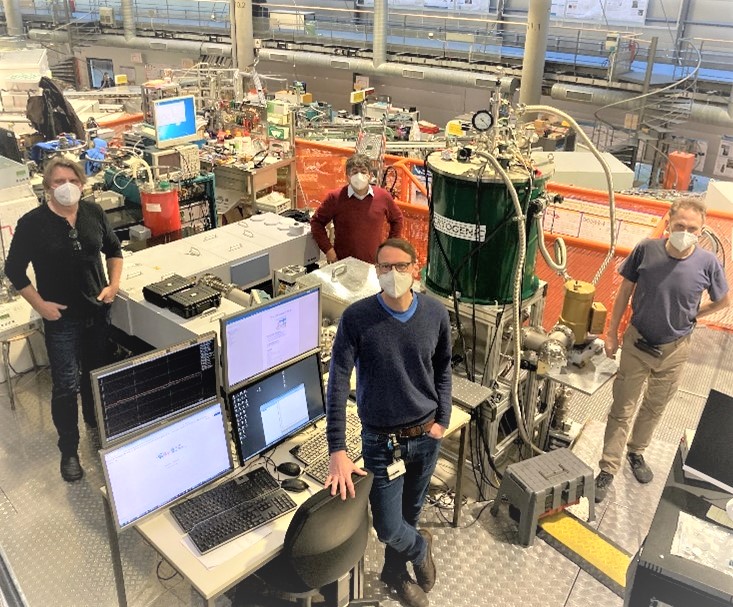New 12 T magnet on BESSY II’s experimental floor strengthens energy and magnetism research

Exhausted but happy: f.l.t.r. - K. Holldack (HZB), A. Schnegg (MPI CEC Mülheim, HZB), T. Lohmiller (HZB, HUB), D. Ponwitz (HZB) after the successful commissioning of the new 12T magnet (green).
Electron paramagnetic resonance (THz-EPR) at BESSY II provides important information on the electronic structure of novel magnetic materials and catalysts. In mid-January 2022, the researchers brought a new, superconducting 12-T magnet into operation at this end station, which promises new scientific insights.
At the THz-EPR end station, unique experimental conditions are provided through a combination of coherent THz-light from BESSY II and high magnetic fields. These capabilities have now been extended by a new superconducting 12 T magnet, acquired through funding from the BMBF network project “ERP-on-a-Chip” and HZB.
“The extended capabilities of the new setup will allow exciting new science with user groups and within our joint lab EPR4Energy operated together with Max Planck Institute for Chemical Energy Conversion, Mühlheim. We are very pleased about the successful commissioning of the superconducting magnet, which currently delivers the highest magnetic field at BESSY II”, says Karsten Holldack, the responsible beamline scientist.
(red)
https://www.helmholtz-berlin.de/pubbin/news_seite?nid=23346;sprache=en
- Copy link
-
10 million euros in funding for UNITE – Startup Factory Berlin-Brandenburg
UNITE – Startup Factory Berlin-Brandenburg has been recognised by the Federal Ministry for Economic Affairs and Energy as one of ten nationwide flagship projects for science-based start-ups. UNITE is to be established as a central transfer platform for technology-driven spin-offs from science and industry in the capital region. The Helmholtz Centre Berlin will also benefit from this.
-
Helmholtz Doctoral Award for Hanna Trzesniowski
During her doctoral studies at the Helmholtz Centre Berlin, Hanna Trzesniowski conducted research on nickel-based electrocatalysts for water splitting. Her work contributes to a deeper understanding of alkaline water electrolysis and paves the way for the development of more efficient and stable catalysts. On 8 July 2025, she received the Helmholtz Doctoral Prize, which honours the best and most original doctoral theses in the Helmholtz Association.
-
Research up close! The Long Night of Science at HZB
On 28 June, it's that time again: the Long Night of Science will take place from 5 pm to midnight in Berlin and also in Adlershof! Come around and take a look behind the scenes of our exciting research.
